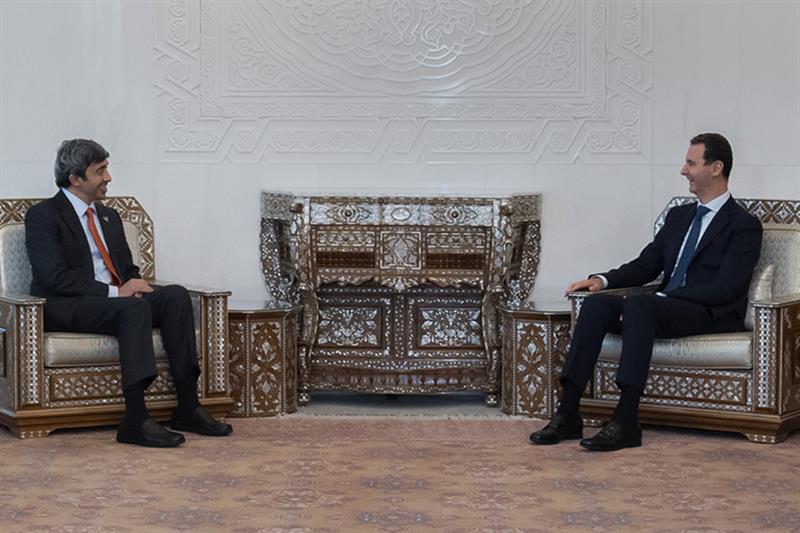
Bashar and Bin Zayed in Damascus (photo: AP)
The hope that Syria will return to the Arab League received a boost earlier this month after the remarkable visit by UAE Foreign Minister Sheikh Abdullah Bin Zayed to the Syrian capital Damascus and his meeting with Syrian President Bashar Al-Assad. It was the first high profile visit by a Gulf official to Syria since war broke out in the country over a decade ago.
The Emirati diplomatic visit followed a telephone call between Al-Assad and Abu Dhabi Crown Prince Sheikh Mohamed Bin Zayed, the Syrian official media reported. In October, Al-Assad had another call with Jordanian monarch King Abdullah II, in what seemed part of a new Arab opening up to Syria.
Though Saudi Arabia is still not overtly opening up to President Al-Assad, the UAE had already opened its embassy in Damascus by the end of 2018. It previously severed relations with Damascus as part of an overall Gulf boycott of the government and support of the opposition. It was mainly Saudi Arabia and Qatar strongly supporting the Islamist fighters against the Al-Assad regime. They cooperated with Turkey at the time, aiming for a regime change that was also backed by the United States.
As Bel Trew wrote in the The Independent, that regime change operation failed and Al-Assad won: “The UAE, voraciously practical when it comes to its national interests, has long wanted to normalise relations with the Al-Assad regime… But clearly, the tiny but feisty Gulf state feels like it must position itself as the public go-to mediator for Syria as it continues to sculpt itself as a power broker in the region. It became the first Gulf country to recognise Israel last year.”
In a number of tweets, Emirati academic and political analyst Abdulkhaleq Abdullah summed up the goals of UAE foreign minister’s visit to Syria: helping the Syrian people reclaim their position, contributing to the return of 10 million Syrian refugees, increasing Arab presence in Syria, organising Arab affairs, reducing Iranian presence in Syria and working to end the Turkish occupation. Abdullah also added in an interview, “Somebody had to do this job and the UAE did it… The UAE’s position is ‘enough is enough, let’s turn a page’. For one thing, Al-Assad is here to stay… no one likes him as a person or what he has done but in many ways he has won... The Syrian opposition is in shambles... Dealing with the realities on the ground will help the Syrian people.”
Sheikh Abdullah Bin Zayed left Damascus to visit the Jordanian capital Amman, where he met Jordanian Foreign Minister Ayman Al-Safadi. He later had a phone call with his Iranian counterpart Hossein Amir Abdollahian.
The Iranians might be wary of a Gulf rapprochement with Syria aimed at reducing their influence in the Arab country. The same has been going on with Iraq for a while now. Gulf countries are warming to Baghdad in an attempt to reduce Iranian influence there.
But the Iranian daily newspaper The Tehran Times wrote this week that “Iran has already supported the so-called process of returning Syria to the Arab fold. Iranian Foreign Minister has recently spoken over the phone with Sheikh Abdullah and Al-Safadi as well as Algerian Foreign Minister Ramtane Lamamra… In addition, Iran has welcomed the improvement of relations between Damascus and other Arab capitals.”
The Iranian paper went on to say, “Iran’s influence in Syria has never been directed against the UAE and its Arab allies. So it is difficult to see why the Emiratis make efforts to undermine Tehran’s interests in Syria. The UAE push could backfire against it as the Syrian government is unlikely to turn its back on those who helped it during times of crisis. At the end of the day, the UAE was part of the group of countries that worked over the last decade to topple the Syrian government. That they failed to achieve regime change in Damascus doesn’t mean they can become Syria’s allies overnight.”
The irony is that Iran’s only Gulf ally is the one that may not be eager to rehabilitate Syria. Qatar is not considering normalising ties with Syria and “hopes other countries will be discouraged from taking further steps with President Bashar Al-Assad’s government”, as its Foreign Minister Sheikh Mohamed Bin Abdulrahman Al Thani said at a joint news conference with US Secretary of State Antony Blinken in Washington. He added, “It would be wishful thinking to have all the countries in the region united when it comes to the issue of Syria.”
Washington refrained from criticising the Emirati move, or other Arab efforts to rehabilitate Damascus. During the high-profile UAE visit, State Department Spokesperson Ned Price said the US was “concerned” about the meeting and the signal it sent but stopped there, adding that Washington would “leave it to [their] allies to characterise their position on Syria”.
Regardless of Qatar and its ally Turkey’s opposition to the rest of the Gulf warming up to Syria, the process of Syria’s return to the Arab fold is in motion. Algeria, Tunisia, Egypt, Oman, Jordan and the UAE are all in favour of the re-inclusion of Syria. Saudi Arabia might be reluctant but is definitely not opposed to such moves, especially by a close Gulf ally like the UAE, and that is what suggests the possibility of Syria attending the next Arab summit in Algeria earlier next year.
Short link: